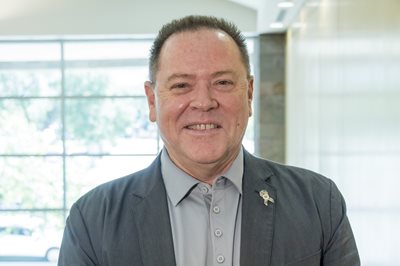At Military Warriors Support Foundation, the mission is to provide support services to gold star families and military veterans who were wounded in combat. A big part of that support is homeownership, and the organization has awarded more than 900 mortgage-free homes to veterans across the country, many of which were donated out of foreclosure. Military Warriors then renovates the homes, with grant funding, for the new owners after participating in a three-year financial literacy and mentoring program.
 "When we first started, that's where the water was so that's where we drank," explains B. Ken Eakes, executive director, who joined forces with a retired general to form the organization around the time of the 2008 foreclosure crisis. Needs have grown and changed over the years, and so has Military Warriors.
"When we first started, that's where the water was so that's where we drank," explains B. Ken Eakes, executive director, who joined forces with a retired general to form the organization around the time of the 2008 foreclosure crisis. Needs have grown and changed over the years, and so has Military Warriors.
To keep up with those changes and look at them from a new angle, Eakes applied to the NeighborWorks Achieving Excellence Program, which, in partnership with Harvard University, trains and coaches 50 leaders over the course of two years. The goal is to help them focus on what matters most. Eakes heritage includes Cherokee, and he became a part of the NeighborWorks program's first Native cohort, which includes organizations that are Native-led or that advance Native community development programs.
Eakes' goal is to diversify income and funding streams for Military Warriors to meet evolving needs. But as part of the Native cohort, he's been learning from peers about the state of housing on and near Indian reservations. He's making connections and seeing overlaps. For instance, he says: A high percentage of American Indians and Alaska Natives have served in the Armed Forces over the years — five times the national average, according to the National Indian Council on Aging.
Native Americans align with veterans in that "they seem to be the last folks who ask for help but the ones who need it the most," Eakes shares. In the military, there's a culture where people don't ask for help. In the Native population, he said, there's a culture where years of dispersion and upheaval have led to the question: "Who do we trust?"
His hope outside his impact project and the training and coaching he's receiving is to help bring more attention to the need for Native housing to the financial agencies that he connects with on a daily basis. He also hopes to help identify and connect Native veterans to homes, as they did at Lakota Funds, a NeighborWorks network organization led by cohort member Tawney Brunsch.
The NeighborWorks' program, he says, "helped me stop and pause and realize how significant the issues are on Native reservations. Now that I know, the question is: ‘Is there something I can do?' I can start to be a part of the solution."
Funding from Wells Fargo supported this newest cohort of Native nonprofit leaders, who expect to stay connected far into the future.
Learn more about the reasons reasons behind the cohort.
11/09/2023

